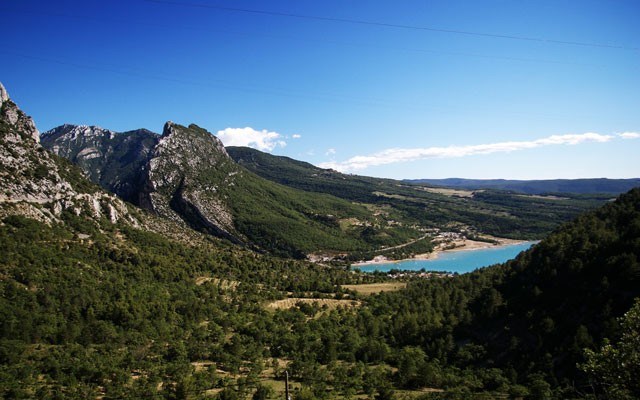"We call it the Sacred Order of Survival: Shelter, Water, Fire, Food," said survival expert Matt Corradino at the Mount Victory Wilderness Camp. We were walking through the rainforest in the camp, which Corradino runs with his knowledgeable wife Carmen, on the tropical island of St. Croix, part of the U.S. Virgin Islands in the Caribbean.
The day before, I had been happily settled at the historic Buccaneer Resort. My luxurious shelter had been a four-poster bed and suite on Mermaid Beach. My water included a jacuzzi bathtub, the warm Caribbean Sea beyond my terrace, and bottled refreshment. Fire were the candles at the Galleon Restaurant, where I enjoyed sumptuous food choices.
I had opted to leave all those seductive comforts — after a couple of restorative days — to head to the interior mountains and jungle of the island and to learn things I hoped I would never need to know, including how to find or "make" water if you are stranded, how to build a shelter out of debris, and how to find food if you are lost or cut off from stores by natural disaster or terrorism.
To me, travel is gathering delights and wisdom, but I am woefully unprepared for disasters — on the road or at home, manmade or natural. I liked the idea that I could complement some island R & R time with some practical skills learned in an exotic, but safe, setting.
We walked from the shady communal area, past some screened guest accommodations up on stilts amidst trees, and on to the rain forest. There, Matt had piles of branches, sticks, leaves, and moss already gathered for my short-cut lesson on "shelter building." I had asked for a kind of speeded-up taster's menu of lessons for survival.
"Even if you think you might be found soon or you think that help is over the next ridge," Matt said, "Statistics show it's best not to go look for help, but to stay close to where you are. Let people find you. Then having a shelter to wait is vital. "You can get hypothermia or heat overexposure in only three hours. You can usually live without water for three days, and food for three weeks, but the elements can get you in three hours. "
The big-picture idea that he emphasized for wilderness survival was, "Everything should be about conservation of energy."
Two of my take-away tips from the shelter lesson:
Build your shelter out of found debris (leaves, branches, grasses). In this situation, "less" is not "more." The more debris layers, the better insulated you are from rain and winds and temperature extremes.
Have your little shelter portal face east, so you get the warmth and light of the rising sun.
He continued to take me to various stations where he had expertly set up mini-lessons. The one I've most repeated to friends involves a clear plastic bag. Turns out, that if you put one around some healthy leaves and close it up, you can receive some possibly life-saving water after the sun's heat has steamed out the moisture from the greens. Solar power to the rescue!
Some people come to the Victory Wilderness Camp for days or weeks, to master hands-on survival practices and "bush skills." Others come for a single workshop, like "how to make useful baskets from local vines," or how to make a tool from stones (a process called knapping).
Carmen likes to work with kids, showing them how to walk quietly with the ball of the foot going down ahead like "first peoples" did. She also conducts exercises on how to enhance the senses of hearing, smelling, and seeing. While I was there, she handed her baby to her husband and climbed up the skinny trunk of a coconut tree to gather very fresh refreshment.
I don't want anyone to get the wrong idea. A vacation trip to the Virgin Islands can be about luscious comforts that go far beyond a basic delivery on the hierarchy of the "sacred order of shelter, water, fire, food." On St. Croix, for example, there's even enchanted kayaking through bioluminescent ("living light") waters with fireflies overhead (go to piquenewsmagazine.com, Feb.17 issue for that story).
St. Thomas offers many resorts including the Frenchmen's Wharf Marriott with an infinity pool and multiple beaches and good restaurants. The capital of Charlotte Amalie is a magnet for cruise ships with 1.5 million visitors a year, duty-free options in shops galore, and an active nightlife.
A ferry-ride away, the smaller St. John is a charming place, where you can be spoiled near "unspoiled settings." The majority of the island is part of the U.S. Virgin Islands National Park, and celebrities enjoying resorts nearby.
Amidst the memories of all the pleasures and pampering of my island time, however, an iconic survival scene blazes: At Camp Victory, a bearded man rubbed sticks and blew life into wood. Flames licked the dark with light, and I sat near that campfire made without matches under a starry canopy, like so many humans throughout millennia around the world, feeling safer with a deep primal comfort.
For more information:
Mount Victory Camp: www.mtvictorycamp.com
Sea Thru Kayaks VI: seathrukayaksvi.com
The Buccaneer: www.thebuccaneer.com
Frenchmen's Reef and Morning Star Marriott Beach Resort: www.marriott.com/hotel-search/st-croix.hotels.virgin-islands-us.marriott-hotels-resorts-and-suites.travel
US Virgin Islands website: www.visitusvi.com
Go to piquenewsmagazine.com, Feb.17 issue for Part I on St. Croix.




